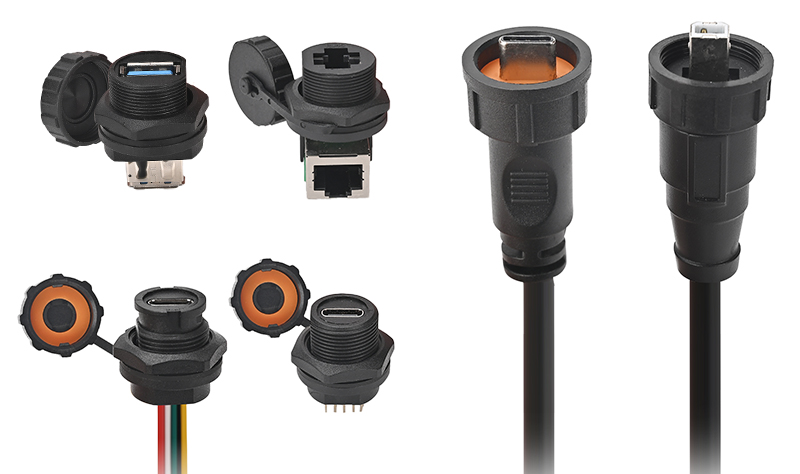In an increasingly connected world, electrical systems are often deployed in environments where they face significant challenges, from moisture and dust to extreme temperatures. For applications exposed to these harsh conditions, the reliability and longevity of electrical connections are paramount. This is where waterproof electrical connectors play a crucial role, offering robust protection and ensuring uninterrupted performance.

What Exactly Are Waterproof Electrical Connectors and How Do They Function?
Waterproof electrical connectors are specialized components designed to establish a secure and sealed electrical pathway between devices, even in the presence of water or other liquids. Their core function is to prevent moisture, dust, and other contaminants from infiltrating the connection point, which could otherwise lead to short circuits, corrosion, and system failure.
This protection is typically achieved through meticulous design and material selection. Many waterproof connectors incorporate elements like compressed gaskets, rubber O-rings, or other sealing mechanisms that create a tight barrier against external elements. The insulating and sealing parts are often made from durable materials such as high-grade rubber or silicone, chosen for their resilience and water-repellent properties. Due to these features, they are indispensable in demanding sectors like marine technology, where equipment is constantly exposed to saltwater, and transportation, where vehicles and infrastructure face varying weather conditions.
Decoding IP Ratings: Your Guide to Waterproofing Levels
When selecting waterproof connectors, understanding Ingress Protection (IP) ratings is essential. Governed by the international standard IEC 60529, IP ratings provide a standardized way to measure a connector’s resistance to both solid particles (like dust) and liquids.
An IP rating consists of two digits:
The first digit indicates the level of protection against solid objects, ranging from larger body parts to microscopic dust particles.
The second digit signifies the level of protection against liquids, from dripping water to prolonged immersion under pressure.
Common examples include IP67, which means the connector is completely dust-tight and can withstand immersion in water up to 1 meter deep for 30 minutes. An IP68 rating typically indicates protection against continuous immersion in water under conditions specified by the manufacturer, often deeper and for longer durations than IP67. Choosing a connector with an appropriate IP rating for your specific application is vital to prevent premature corrosion, electrical faults, and costly system downtime.
It’s important to note that an IP rating is generally valid when the connector halves are fully mated. If a connector is unmated and exposed, it may lose its protective qualities unless it is specifically designed to maintain its IP rating in an unmated state or if protective sealing caps are used.
Choosing the Right Waterproof Connector: Key Factors to Consider
Selecting the ideal waterproof electrical connector requires careful consideration of several factors:
- Equipment and Application Compatibility:The connector must be suitable for the specific equipment and the operational environment. This includes matching voltage and current requirements, as well as understanding the expected exposure to environmental stressors.
- Ingress Protection (IP) Rating:As discussed, select an IP rating that accurately reflects the level of protection needed against water, dust, and other debris relevant to your application.
- Material Type and Design:The choice of material impacts durability and resistance. Plastic connectors (e.g., polycarbonate, PBT) are often lightweight, cost-effective, and offer good chemical resistance. Metal connectors (e.g., stainless steel, aluminum with anti-corrosion coatings) provide greater robustness and are ideal for more demanding physical environments.
- Industry Requirements and Certifications:Ensure the connectors comply with relevant industry standards and certifications, such as UL, ISO, or CE, to guarantee safety and reliability.
Notable Features That Define Quality Waterproof Connectors
Beyond basic waterproofing, high-quality connectors offer several advantageous features:
- High Current and Voltage Tolerance:They are engineered to maintain reliable electrical conductivity and signal integrity even when subjected to challenging environmental conditions.
- Durable Material Composition: Constructed from high-grade, corrosion-resistant materials, these connectors are built to last, resisting degradation from moisture, chemicals, and UV exposure.
Where Are Waterproof Cable Connectors Commonly Used?
The versatility and reliability of waterproof connectors make them suitable for a wide array of applications:
- Industrial Automation:In factories and processing plants, they ensure the dependable transmission of data and control signals for robotic systems, programmable logic controllers (PLCs), and distributed control systems (DCS), often in environments with moisture or particulate matter.
- Medical Technologies:For mobile medical equipment and diagnostic devices that may be exposed to liquids or require sterilization, waterproof connectors maintain electrical integrity and patient safety.
- Lighting and Outdoor Electronics:From outdoor LED displays and architectural lighting to environmental monitoring systems, these connectors provide stable power and control signals, enduring rain, snow, and temperature fluctuations.
Marine and Transportation: Essential for navigation systems, onboard electronics, and vehicle control units, where exposure to water and harsh elements is common.
In Conclusion: The Indispensable Role of Waterproof Connectors
Waterproof electrical connectors are more than just components; they are critical enablers of reliability, safety, and sustained performance in a multitude of applications that operate in challenging environments. By protecting sensitive electrical connections from the detrimental effects of moisture, dust, and other contaminants, they not only enhance operational efficiency but also significantly reduce maintenance requirements and extend the lifespan of valuable equipment. Investing in the right waterproof connectors is an investment in the seamless and enduring operation of your electrical systems.
Post time: June 6th 2025

 Emily2014515
Emily2014515